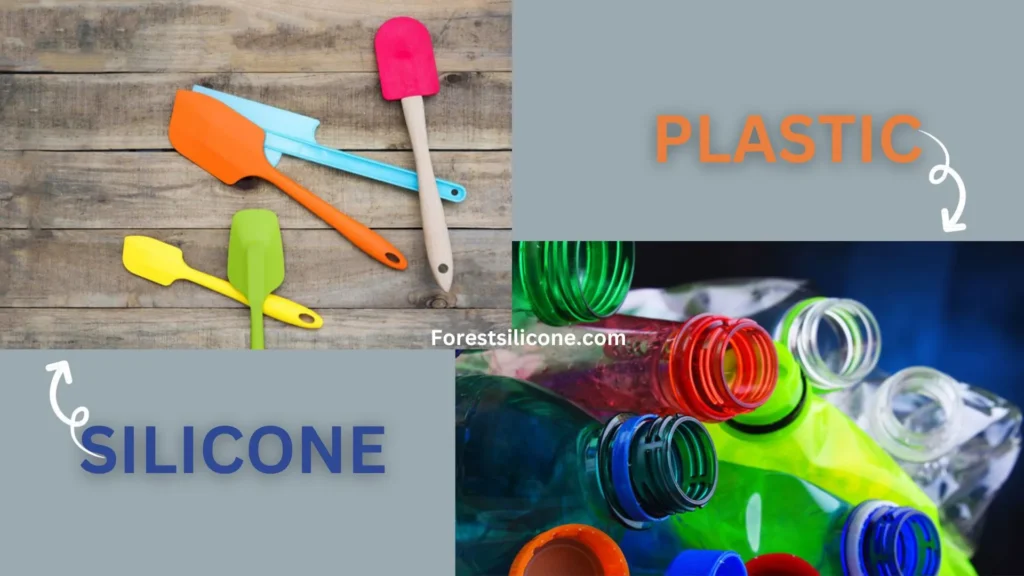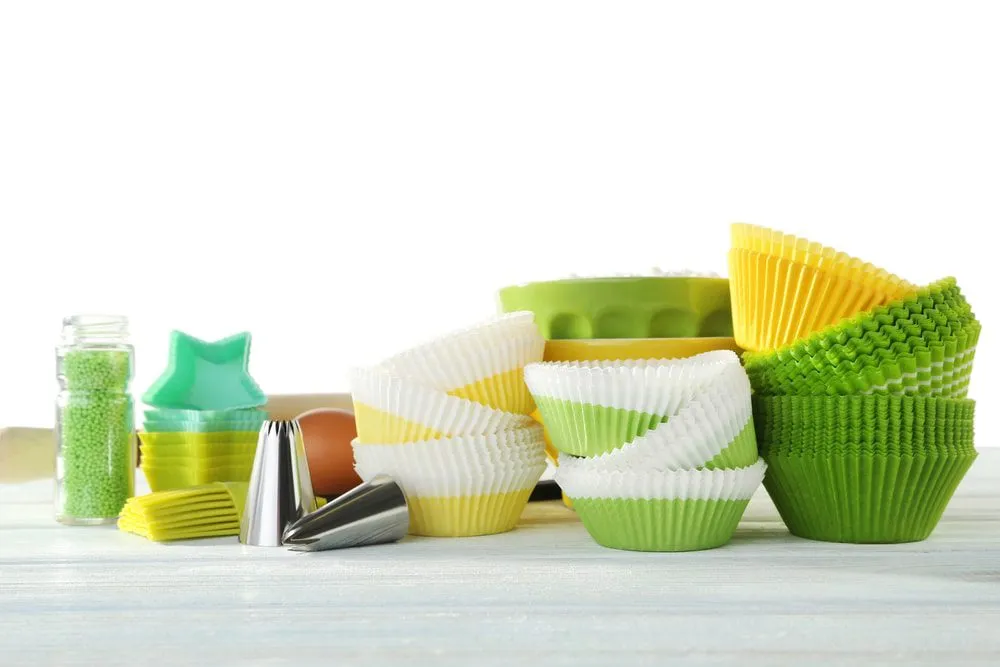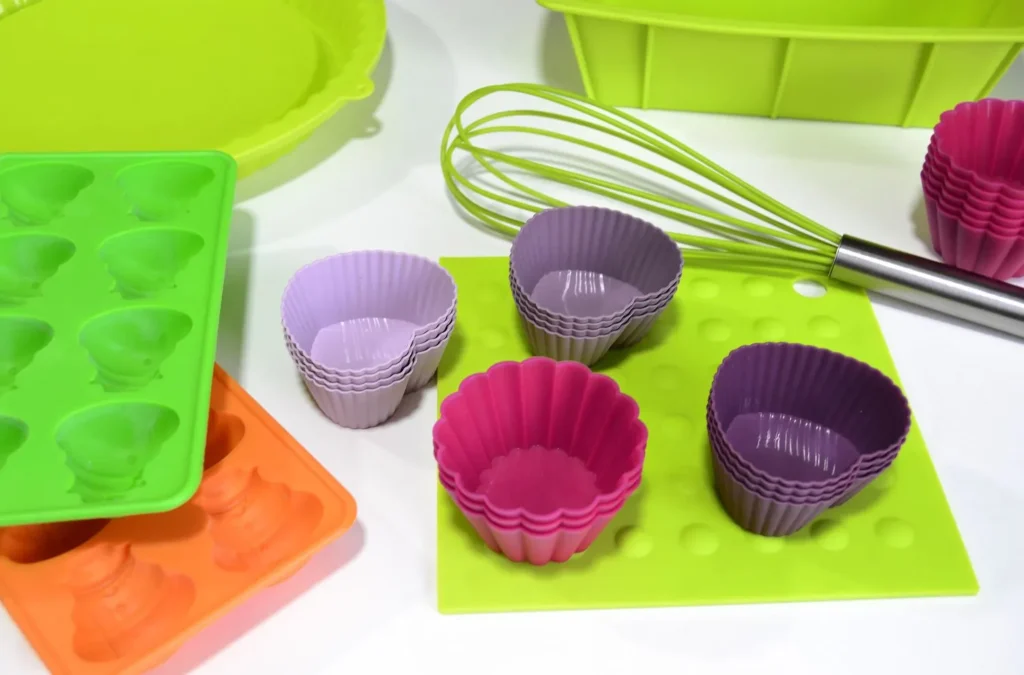The problem of our reliance on conventional plastics is well documented; from the lengthy decomposition process to the scourge of microplastics in the world’s oceans. Although silicone has recently received a lot of attention as a sustainable substitute for plastic items, it might be oversimplifying the situation to claim that silicone is superior to plastic on an objective basis. Here, we will talk about the specific differences between silicone and plastic as well as how it affects the environment.

Where Is Silicone Used and what silicone is used for?
Though we perhaps most frequently associate silicone with kitchenware like oven mitts, muffin molds, and spatulas due to its rubbery flexibility and tolerance to high temperatures, silicone exists in many more states than these well-known ones. It has a wide range of applications in the construction, electronics, cosmetics, and aviation industries. It can be made as a liquid, paste, grease, oil, or rubber.

Silicone is used in more goods than you may think. Silicone can be found in toiletry items such as makeup, shampoo, lotion, and deodorant. You can also find it in many electronics, including your laptop and phone, and in solar panels since the material can withstand the heat of the sun day after day.
Is silicone durable?
Yes. Owing to silicone’s reliable performance, it is also utilized in the construction of buildings, airplanes, and your own home (where it is typically found in caulk). Silicone is also used in kitchenware, sealants for roads and bridges, and swimming goggles. Because of its flexibility, it can be used in many similar ways as plastic, and because of its durability, it can be depended upon as a strong material uneasily corrupted by the elements.
What is Silicone Made From?
There is disagreement about whether silicone is a true plastic in and of itself; the answer varies depending on who you ask. Like plastic, silicone is a polymer, made from a combination of naturally occurring chemicals and synthetic inputs. It is produced by heating up silica (or silicon dioxide) with a carbon fuel source, which yields the natural element silicon (without the ‘e’ of silicone).
Silicon can in fact be found naturally within the earth but is difficult to extract and so is usually produced from the more easily acquired silica (beach sand is almost pure silica, as is quartz). To manufacture the silicone we use on a daily basis, the silicon obtained from this process needs to go through one more step of reaction with hydrocarbons derived from fossil fuels and other chemicals.
How Does Silicone Differ from Plastic?
The most notable functional difference from plastic is the inert quality of silicone, which makes for a significantly more durable product over the long term. It also boasts a greater flexibility than most plastics and will not break down when exposed to high heat or freezing in the way that plastic would (think of those old plastic ice trays that always seem to crack sooner or later).
Does This Mean Silicone Is Better Than Plastic?
The short answer is yes; the robustness and longevity of silicone suggest that it is a better choice, both for the environment and practical consumer use when compared to similar plastic products. Our society’s consumption of plastics is incredibly destructive and unsustainable; silicone items are always multi-use and have longer lifespans, but plastics are mostly single-use.
Replacing a layer of saran wrap or aluminum with a flexible silicon lid stretched over a bowl of leftovers can entirely cut out the need for certain single-use products. Furthermore, silicone does not decompose into the hazardous microplastics that contaminate our oceans and endanger aquatic life to such an extent. Furthermore, silicone does not emit the dangerous pollutants that plastics do when they burn; instead, silicone ashes are burned and return to silica, having no adverse effects on the environment.
Is Silicone Plastic?
Despite its association with plastic, silicone is actually a synthetic rubber. In other words, despite certain practical and functional similarities, silicone and plastic are not the same. The components of the two materials differ, though. The primary distinction between the two materials, in terms of environmental impact, lies in their manufacturing and sourcing processes.
While silicone does have a man-made element to it, plastic is a fully man-made material that is formed from resources such as crude oil which is extracted from the Earth. The way in which this material is sourced is the subject of much controversy due to the large carbon footprint it leaves.
Plastic is also mainly made for single use with a huge 40% of all plastic being used once before being thrown away.
On the other hand, silicone comes from silica which is a naturally occurring substance. While the heating process to turn silica into silicon then into silicone can be an environmentally damaging process, it is at least less damaging than plastic.
Due to their functional similarities as well as shared characteristics including flexibility, transparency, and resistance to temperature and water, silicone and plastic are frequently contrasted. Compared to its plastic equivalent, silicone is more structurally resilient and lasts longer.
That alone doesn’t absolve it from its potential to harmfully impact the environment, however, it can be a better alternative to those looking to move away from plastic while still being budget-conscious.
As we now know, silicone is a hybrid material whereas plastic is completely man-made. In those regards, it can be seen as an eco-friendlier option.
As with plastic, silicone does have the problem of proper disposal (though it can be recycled, more on that below), it is easy to source and is relatively cheap to produce. Silicone is a great option to get you started toward an eco-friendlier lifestyle without going broke in the process.
As with any product, there’s going to be some advantages and disadvantages. Let’s discuss what silicone has to offer and some of its not-so-great attributes as well.
Silicone has an array of advantages but the biggest is its use in the kitchen! Cooking utensils, baking sheets, etc. using silicone are completely safe for food-grade applications. Since the material doesn’t react with food or beverages and doesn’t break down when heated, it makes it the perfect versatile material at home and in restaurants.

It’s heat and water-resistant so perfect for the oven and dishwasher which makes it easy to use, clean, and maintain. That durability comes in handy when talking about sustainability. A silicone product will last much longer than a plastic one, and if you do manage to burn it, there are no harsh chemicals released into the air.
Pinching the surface and looking for a color shift is an excellent technique to determine whether the product is made entirely of silicone or if it contains any form of chemical filler. If the product’s color does change, it could be because of an artificial ingredient in the silicone, which makes it less resilient.
Silicone is wonderfully multifunctional with an ever-expanding list of products made from the material.
Disadvantages to Silicone
You can’t sing its praises without also considering the more problematic aspects of silicone in order to truly make an informed decision.
The biggest disadvantage to silicone is that it is not a naturally renewable material because of its hybrid composition. But if you’re wondering ‘is silicone biodegradable?’, unfortunately, the answer is no.
Because of that hybrid nature, it isn’t biodegradable. Meaning if you don’t dispose of it properly, it’ll sit in a landfill for hundreds of years making it as bad as plastic.
Even if the material is heat-insensitive, very high temperatures have the potential to destabilize it and produce chemicals that will eventually wear it down. causing you to swap out that silicone baking sheet as soon as possible in case you unintentionally broil those cookies.
There is a difficult process in properly recycling silicone. Because of that many consumers don’t want to bother and will throw it out with their general waste thus adding to the landfill problem.
Is Silicone Recyclable?
Here’s the big question, can silicone be recycled. Yes, it can. However, it isn’t as easy as simply putting it into the recycling bin with the rest of your recyclable household waste.
When finished with a silicone product it needs to be taken to a specific recycling center that accepts silicone.
So how is silicone recycled? Once taken to the specialized facility the silicone products are broken down into siloxane compounds. This compound gets depolymerized into an oil which can then be used for industrial machines, water repellents, etc.
Is Silicone Safe to Use?
Silicone is generally a safe product otherwise it wouldn’t be used around our food and our bodies. However, this does depend on the processing and creation of silicone (remember that trick of checking discoloration in silicone for unwanted chemicals). There have been instances where silicone was not properly maintained and toxic siloxane compounds were formed.
To ensure the safety of silicone is upheld, always make sure your products have been thoroughly cleaned before each use and properly maintained.
When using silicone to store food, look for food-grade silicone products. And when using it for hygiene or beauty, look for medical-grade silicone.
Silicone vs. Plastic: Who Wins?
Although they share many characteristics, silicone easily beats out plastic as a safer, non-toxic, and more eco-friendly alternative. Silicone isn’t perfect. It is not biodegradable, its production process consumes non-sustainable natural resources, and recycling is challenging for the typical individual. But silicone does not pose the same hazards as conventional plastic, particularly in terms of breaking down into microplastic. Because plastic impacts our oceans and water systems in such a dangerous way, silicone is preferred to plastic.
Ready to make the switch from plastic to silicone? Forestsilcone connects you with products that are sustainable for you and your home as well as the environment.